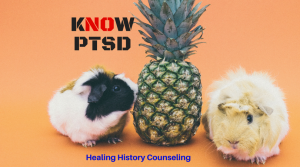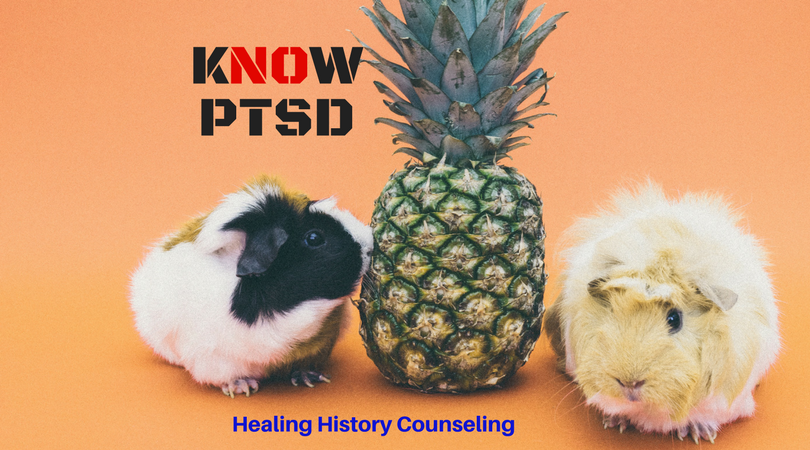

KNOW PTSD: 15 tips for Loving with PTSD
Being as this is Valentines week, I’ve decided to focus my blog on LOVE. More specifically: how PTSD impacts being in a romantic relationship. When half of a couple has PTSD, both people are deeply impacted. But PTSD does not have to mean your relationship is doomed. I wouldn’t even say that it takes extra effort, but I would say that a romantic relationship with PTSD is less tolerant of less effort. No relationship, once past lust and into love, is all easy and automatic. But in a relationship without PTSD, it can be possible to skate along with limited attention for significantly longer than is possible when one partner has PTSD. The journey can become rocky rather quickly when PTSD is in the mix. In the interest of brevity, I’ll link to aspects that I have already covered: What is PTSD & How to help someone with PTSD and focus more specifically on those aspects that are unique to being in a romantic relationship that also includes PTSD.
First it is vital to point out that the particulars of the trauma behind the PTSD will greatly affect the impact the PTSD has on the relationship. Someone who developed PTSD from combat experience will have specific challenges that will be different from those experienced by someone who developed PTSD from a sexual assault. There will also be similarities. These lists are a guide and starting point and should be adjusted for your particular relationship.
15 tips for mixing PTSD and Romantic Relationships:
5 Tips For both people involved:
- Communication: You need to talk about it! You need to talk about it again! And again! This is not a one and done topic. The PTSD, the impact of the PTSD, and the relationship will need to be revisited repeatedly (particularly as you are both learning how to love each other with PTSD in the mix). The impact of PTSD can change and fluctuate drastically and thus the impact on the relationship will change and fluctuate. Revisit, refine, and re-examine regularly.
- Own mistakes: Everyone will mess up, it’s a fact of being human. It is important to be aware of mistakes and bravely own them to each other. If you blow your top, PTSD can make tempers short, then you need to own it. If you forget to consider your partner’s PTSD and send them into a meltdown, then you need to own it. Getting it right every time will not happen and expecting that is unfair. Constantly trying to get it right and do better is a reasonable expectation.
- Be flexible: PTSD can really mess up plans! The concert you couldn’t imagine missing last month may now just be an intolerable crowd that feels overwhelming. The evening out planned just hours ago may need to be cancelled due to PTSD symptoms making the outing impossible. It can be challenging to accommodate PTSD when it ruins yet another evening but being able to adjust is vital. Both people need to stretch themselves without over-extending. Learning to push the edges of the PTSD is good. Learning to not push beyond capacity is also vital. Finding that balance takes practice and flexability.
- Focus on good: Don’t let the good times become known as the “not bad” times. There will be times that are harder than others. It can be a relief to get a reprieve from those challenging times. Shifting the focus from “I’m glad that has passed” to “I’m glad we are having this” is both subtle and significant. Where you focus becomes the goal. Watching the goal doesn’t mean you won’t have bad parts, but it does mean you won’t be where you were aiming for when you do. It also doesn’t mean not preparing for the bad. This also shifts how you prepare for the rough parts. You can prepare for the hard parts because they are inevitable, awful, and unavoidable or you can prepare for the hard parts because preparing will help you get back to the better faster.
- Get support: Having your relationship encouraged, appreciated and supported by others can be beneficial to the vitality of the relationship. Double date, find (or create) activities that are done by couples, join a couples’ activity group/organization, seek a relationship coach or couples therapist that can help you strengthen and encourage your union. Relationships can be hard, PTSD can make them harder. Having support can really help!
5 Tips for the Partner of the Person with PTSD:
- Support: It can be hard being in a relationship with someone with PTSD. Connecting with other people who are either going through something similar or are simply understanding and compassionate is important. Figure out who those people are and maintain regular connections with them. It can be helpful to find a support group, group therapy, or to work with your own therapist if you don’t feel you can lean on or get enough support from your existing network of friends and family. A word of caution – don’t just share the bad or difficult with your friends and family. Your friends and family care deeply for you and if they only hear about the struggles they may start to advocate against your relationship. Making sure they also hear about the good or choosing to find a separate support group can help prevent this from happening.
- Self-care: Everyone is a rechargeable battery. Self-care is the recharging that ensures you can be fully available to your relationship. Figure out what activities make you feel renewed and make sure they are a regular part of your life. Some of this recharging will come from the relationship with your partner, when things are good pay attention and really absorb the wonder of it. Some of it will also need to come from other sources. PTSD has peaks and valleys, times when it’s worse and others when it’s less bad. During those worse times you will need to pay extra attention to your self-care.
- Create safe: One overriding aspect of PTSD is a constant feeling of needing to be vigilant to danger and feeling unsafe. Helping your partner figure out what feels safe and how you can help them feel less at risk is important. You want to either be part of the solution or neutral. You want to avoid making things worse as much as possible. Learning more about PTSD, your partners particular experience of PTSD, and what is helpful/harmful is very important.
- Become comfortable with change: PTSD changes people. Even if you’ve only known them after they developed PTSD, they will continue to change as they live with and process through their PTSD. If you loved them before the PTSD, you may have to work even harder to learn to love this changed version you now have. Even once the trauma is healed and the PTSD is resolved, they will not be the same person they were before the trauma and PTSD (think of it like this: You are not the same person you were before puberty – you are not necessarily better or worse, but you are definitely different).
- It’s a process: Healing PTSD and the trauma underlying PTSD takes time. Sometimes a great deal of time. There are no miracle fixes, expecting them to have it fixed in a set time isn’t realistic. A traumatic accident that happened a year ago can take less time than a childhood full of abuse but there isn’t any way to nail down how long at the beginning. Each person, each trauma, each partner, each healing experience is unique and thus how long is also unique.
5 Tips for the Person with PTSD:
- Risk sharing: Allow them in, let them help. Don’t share recklessly, but do share everything you are both ready for. Start small, share a piece. How did it feel to share that? How did they handle it? Did it go better than you expected? Worse? If it went well, share a bit more. If it didn’t go as well, then talk about it. Help them understand and become better with it. Once that is achieved, share some more.
- Get more support: Struggling with PTSD is hard! The more resources and support you build around yourself the less strain it will put on your relationship (a tricycle is more stable than a unicycle). Your partner should be a support, they should not be your only support. Add reliable friends, extra-curricular activities, a support group, a therapist.
- Own that this is hard: PTSD is hard. Loving someone with PTSD is hard. Cutting yourself and your partner some slack is vital to strengthening rather than straining your relationship.
- Work on it: Part of what makes loving someone with PTSD manageable is knowing that they are going through something and that there is an other side. The dark tunnel is traversable because it leads out to somewhere. If you want your partner to stick it out, then you have to dig in and work on healing.
- Appreciate them: Make sure your partner knows how much you appreciate their efforts. Tell/show them this regularly. Don’t wait for anniversaries or holidays to express your gratitude and love. Knowing our efforts are appreciated makes it easier to make those efforts! It doesn’t have to be big or extravagant, just heart felt.
PTSD changes the person with it, the person in the relationship with the person with it, and it changes the relationship. It does not have to ruin the relationship, but it does require some attention by the people in the relationship if they want their love to thrive and grow through the PTSD. I hope you have found this helpful. I would love to hear your thoughts or opinions about this post.
I am a therapist in Austin Texas. I specialize in helping adults heal from difficult childhoods, childhood trauma, CSA (Childhood Sexual Abuse), sexual assault, PTSD (Post Traumatic Stress Disorder) and cPTSD (complex PTSD). I offer a free 30-minute, in person, consultation. This is a great opportunity to learn more about the services I offer, how I work, and how I may be able to help you heal.
Leave a Reply